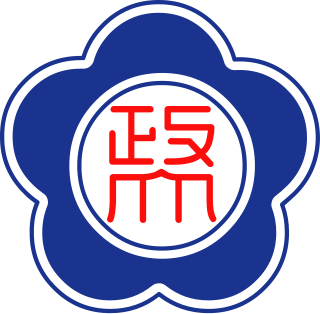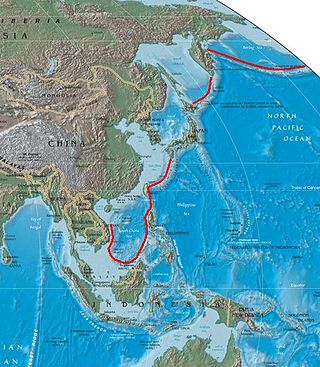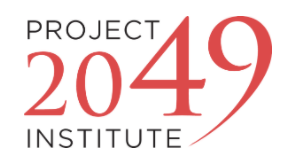
The Republic of China Armed Forces are the armed forces of Taiwan. They consist of the Army, Navy, Air Force and Military Police Force. The military is under the civilian control of the Ministry of National Defense, a cabinet-level agency overseen by the Legislative Yuan.

The Taiwan Relations Act is an act of the United States Congress. Since the formal recognition of the People's Republic of China, the Act has defined the officially substantial but non-diplomatic relations between the US and Taiwan.
The political status of Taiwan or the Taiwan issue is a long-running dispute on the political status of Taiwan, currently controlled by the Republic of China (ROC). This dispute arose in the mid-twentieth century, and is ongoing.

National Chengchi University is a public research university in Taipei. The university is also considered as the earliest public service training facility of the Republic of China. First established in Nanjing in 1927, the university was subsequently relocated to Taipei in 1954.

Cross-Strait relations are the relations between China and Taiwan.
The United States foreign policy toward the People's Republic of China originated during the Cold War. At that time, the U.S. had a containment policy against communist states. The leaked Pentagon Papers indicated the efforts by the U.S. to contain China through military actions undertaken in the Vietnam War. The containment policy centered around an island chain strategy. President Richard Nixon's China rapprochement signaled a shift in focus to gain leverage in containing the Soviet Union. Formal diplomatic ties between the U.S. and China were established in 1979, and with normalized trade relations since 2000, the U.S. and China have been linked by closer economic ties and more cordial relations.
The String of Pearls is a geopolitical hypothesis proposed by United States political researchers in 2004. The term refers to the network of Chinese military and commercial facilities and relationships along its sea lines of communication, which extend from the Chinese mainland to Port Sudan in the Horn of Africa. The sea lines run through several major maritime choke points such as the Strait of Mandeb, the Strait of Malacca, the Strait of Hormuz, and the Lombok Strait as well as other strategic maritime centres in Pakistan, Sri Lanka, Bangladesh, the Maldives, and Somalia.
Michael Dalzell Swaine is an expert in China and East Asian security studies. Swaine is a senior research fellow at the Quincy Institute for Responsible Statecraft. Prior to joining the Quincy Institute, Swaine was a Senior Associate in the Asia Program at the Carnegie Endowment for International Peace. Before joining the Carnegie Endowment as co-director of the China Program in 2001, Swaine worked for 12 years at the RAND Corporation, where he was appointed as the first recipient of the RAND Center for Asia-Pacific Policy Chair in Northeast Asian Security.

Douglas Haines Paal is vice president for studies at the Carnegie Endowment for International Peace, where he directs the endowment's Asia Program. He served as the director of the American Institute in Taiwan from 2002 to 2006 and worked on the National Security Council staffs of Presidents Reagan and George H. W. Bush between 1986 and 1993 as director of Asian Affairs, senior director, and special assistant to the President. He was vice chairman of JPMorgan Chase International from 2006 to 2008. He also serves as a member of the board of trustees of the Asia Foundation.

Territorial disputes in the South China Sea involve conflicting island and maritime claims in the region by several sovereign states, namely the People's Republic of China (PRC), Taiwan, Brunei, Malaysia, the Philippines, and Vietnam. The disputes involve the islands, reefs, banks, and other features of the South China Sea, including the Spratly Islands, Paracel Islands, Scarborough Shoal, and various boundaries in the Gulf of Tonkin. The waters near the Indonesian Natuna Islands, which some regard as geographically part of the South China Sea, are disputed as well. Maritime disputes also extend beyond the South China Sea, as in the case of the Senkaku Islands and the Socotra Rock, which lie in the East China Sea.

The first island chain refers to the first chain of major Pacific archipelagos out from the East Asian continental mainland coast. It is principally composed of the Kuril Islands, the Japanese archipelago, the Ryukyu Islands, Taiwan (Formosa), the northern Philippines, and Borneo, hence extending all the way from the Kamchatka Peninsula in the northeast to the Malay Peninsula in the southwest. The first island chain forms one of three island chain doctrines within the island chain strategy in the U.S. foreign policy.

Yasuhiro Matsuda is a Japanese professor of international politics at the University of Tokyo.
Sarah C. Paine is a professor of strategy and policy at the U.S. Naval War College located in Newport, Rhode Island. She has written and co-edited several books on naval policy and related affairs, and subjects of interest to the United States Navy or Defense. Other works she has authored concern the political and military history of East Asia, particularly China, during the modern era.

Randall G. Schriver, also known as Randy Schriver, is the Chairman of the Project 2049 Institute, and previously served as Assistant Secretary of Defense for Indo-Pacific Security Affairs in the United States government. He concurrently holds positions as a Commissioner on the United States–China Economic and Security Review Commission, and a partner at Pacific Solutions. Previously, Schriver served as Deputy Assistant Secretary of State for East Asian and Pacific Affairs and was a founding partner of Armitage International.
Prospect Foundation, is a think tank based in Taiwan, established in 1997, which aims to analyze the Cross-Taiwan-Strait relations and international politics and economy and provide suggestions of policies for Taiwan government. There are about a dozen of research fellows in Prospect Foundation who research and analyze the development of Cross-Strait relations and international developments.
Geostrategy in Taiwan refers to the foreign relations of Taiwan in the context of the geography of Taiwan. Taiwan is an island country in East Asia, while it is also located at the center of the first island chain and commands the busy traffic of Taiwan Strait and Bashi Channel.

Chihhang Air Base, also known as Taitung Air Force Base, is a military airport operated by the Republic of China Air Force in Taitung County, Taiwan. It is best known for its extensive underground hangars.

The Project 2049 Institute, also known as Project 2049, is a non-partisan think tank based in Arlington, Virginia focusing on United States foreign policy and security issues in the Asia-Pacific region, particularly those related to China and Taiwan. It receives "grants and contracts from the U.S. government, like-minded governments, charitable foundations, major corporations, and individual donors."

Oriana Skylar Mastro is an American political scientist currently serving as a Courtesy Assistant Professor of Political Science at Stanford University and Center Fellow (tenure-track) at Stanford's Freeman Spogli Institute for International Studies. She is also a non-resident senior fellow at the American Enterprise Institute and continues to serve in the US Air Force Reserve as a strategic planner at the US Indo-Pacific Command.
Ivan Kanapathy is an American security analyst currently serving as Vice President of Beacon Global Strategies, an adjunct professor at Georgetown University Walsh School of Foreign Service, a senior associate with the Freeman Chair in China Studies at the Center for Strategic and International Studies (CSIS), and a senior fellow at the Center for Strategic and Budgetary Assessments. Between March 2018 and July 2021, he was director for China, Taiwan, and Mongolia and deputy senior director for Asian affairs at the White House National Security Council (NSC) during the Trump and Biden administrations.

![Ian Easton (2nd from left), along with members of delegation from the Project 2049 Institute, visited Office of the President in Taipei, Taiwan on June 12, 2019. 06.12 Zong Tong Jie Jian [2049Ji Hua Yan Jiu Suo ] Xue Zhe Zhuan Jia Fang Wen Tuan (48047350116).jpg](http://upload.wikimedia.org/wikipedia/commons/thumb/8/83/06.12_%E7%B8%BD%E7%B5%B1%E6%8E%A5%E8%A6%8B%E3%80%8C2049%E8%A8%88%E7%95%AB%E7%A0%94%E7%A9%B6%E6%89%80%E3%80%8D%E5%AD%B8%E8%80%85%E5%B0%88%E5%AE%B6%E8%A8%AA%E5%95%8F%E5%9C%98_%2848047350116%29.jpg/220px-06.12_%E7%B8%BD%E7%B5%B1%E6%8E%A5%E8%A6%8B%E3%80%8C2049%E8%A8%88%E7%95%AB%E7%A0%94%E7%A9%B6%E6%89%80%E3%80%8D%E5%AD%B8%E8%80%85%E5%B0%88%E5%AE%B6%E8%A8%AA%E5%95%8F%E5%9C%98_%2848047350116%29.jpg)











